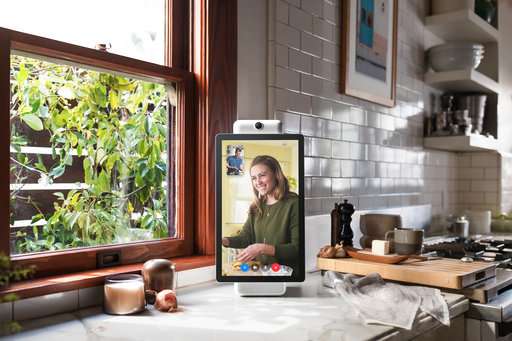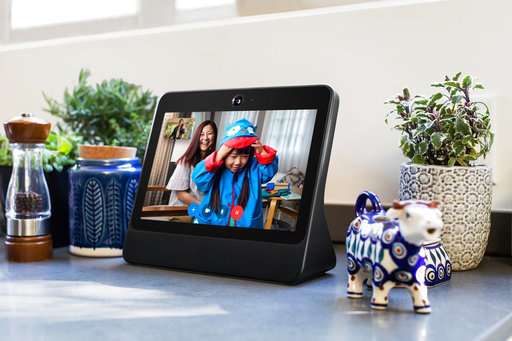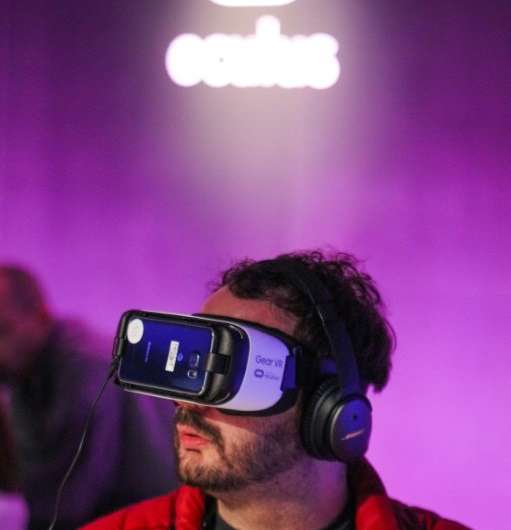Facebook launches AI video-calling device 'Portal'

Facebook on Monday launched a range of AI-powered video-calling devices, a strategic revolution for the social network giant which is aiming for a slice of the smart speaker market that is currently dominated by Amazon and Google.
"It's been a big shift for the company," Facebook's vice president of consumer hardware Andrew Bosworth told AFP before the launch of "Portal".
"We've seen a rise of video calling, on both Messenger and WhatsApp—it has been a tremendous trend," he said.
But the launch of a product putting a camera into people's homes is likely to raise privacy issues for the social media giant, which has suffered several major data breaches this year involving tens of millions of user accounts.
The device, which will be available for pre-order in the United States from Monday, is designed to allow users to make video calls at home without having to stand immediately in front of the screen or hold a phone at arm's length.
Although the social media giant acquired virtual reality headset manufacturer Oculus in 2014, this is the first time it has developed a consumer hardware product in-house.
"At some point, we realised that if we want to continue to advance our mission, the hardware we're dealing with... is limiting, and so we find ourselves building our own hardware to try and accomplish that mission," Bosworth said.

'Hey Portal'
Offering hands-free voice control, Portal comes in two sizes, a 10-inch screen which retails at $199 (173 euros) and a 15-inch version will go for $349. And to start the call, all it takes is: "Hey Portal."
During calls, it can also play music on Spotify or videos from Facebook Watch, as well as tell children stories via augmented effects app Story Time.
And it also comes bundled with Amazon's voice interface "Alexa", enabling users to shop or control household appliances.
During a conversation, the integrated camera can automatically zoom out to include a second person, or be instructed to follow a certain individual as they walk around, even picking out their voice over background noise.
But Facebook has moved to quickly allay security fears, saying that by keeping the processes on the actual device rather than in the cloud, the risk of hacking is lower than with a smartphone or computer.
Calls will be encrypted, and the AI technology runs locally on Portal, not on Facebook servers, with it only sending voice commands to the servers after hearing, "Hey Portal".
The camera can be blocked by a cover and the device has a button for disabling both the lens and the microphone.

A guarantor of privacy?
Security is a sensitive issue for Facebook which had 50 million of its user accounts breached by hackers at the end of last month in the latest privacy embarrassment.
Earlier in the year, it was forced to admit that the personal data of tens of millions of users had been hijacked by Cambridge Analytica, a political firm working for Donald Trump in 2016.
A British company, CA has been accused of collecting and exploiting users' personal data for political purposes without their consent.
Facebook has since reasserted itself as a guarantor of privacy.
"Frankly if we don't build the hardware, I do have concerns," Bosworth admitted, saying it was crucial to put "people first" whether delivering a platform for virtual reality or augmented reality.
"You need to have abuse prevention very early on, you need to have security built in early on."
A cautious welcome
The company worked with a US film director in order to make the camera movements feel natural, said Nick Fell, marketing director for Facebook's Portal team.
"We set out to try and make video calling so good that it feels like you're sharing the same physical space as someone else," he explained.
Facebook representatives prefer to talk about their "mission" rather than business models and profits, but it is clear that wireless speakers and video calls represent a growing market.
There were 17 billion video calls made on Messenger in 2017, double the number in 2016, according to official data.
More than 60 million people in the US will use wireless speakers in 2018, a figure expected to rise to 76.5 million by 2020, according to eMarketer.
But analysts reacted cautiously to the announcement.
"Facebook is a little bit late to the market for smart speakers," said Tom Morrod, a research director for consumer electronics and telecoms at IHS Markit.
"They're going to find that selling hardware scales quite differently from selling platform services."
The social network does not intend to stop with Portal, promising to "invest very heavily, not just hardware through Oculus but also through Facebook," Bosworth said.
© 2018 AFP




















